CHCCSL504A - Personality and Development Theories Assessment Book 4
VerifiedAdded on 2023/02/01
|35
|6664
|29
Homework Assignment
AI Summary
This document presents a completed assessment for the CHCCSL504A unit on Personality and Development Theories, published by the Australian Institute of Professional Counsellors (AIPC). The assessment covers key concepts such as the importance of personality and lifespan development for counselors, the interplay of nature versus nurture, and genetic and environmental factors influencing individuals. It delves into Freud's psychoanalytic perspective, including the id, ego, and superego, and explores psychosexual stages. The assessment includes case studies, requiring the application of theoretical knowledge to real-world scenarios, such as analyzing the factors contributing to depression and alcohol abuse in a client. Furthermore, it addresses levels of awareness and their implications. The assessment demonstrates an understanding of the core principles of personality and development theories, and their application in counseling practice.
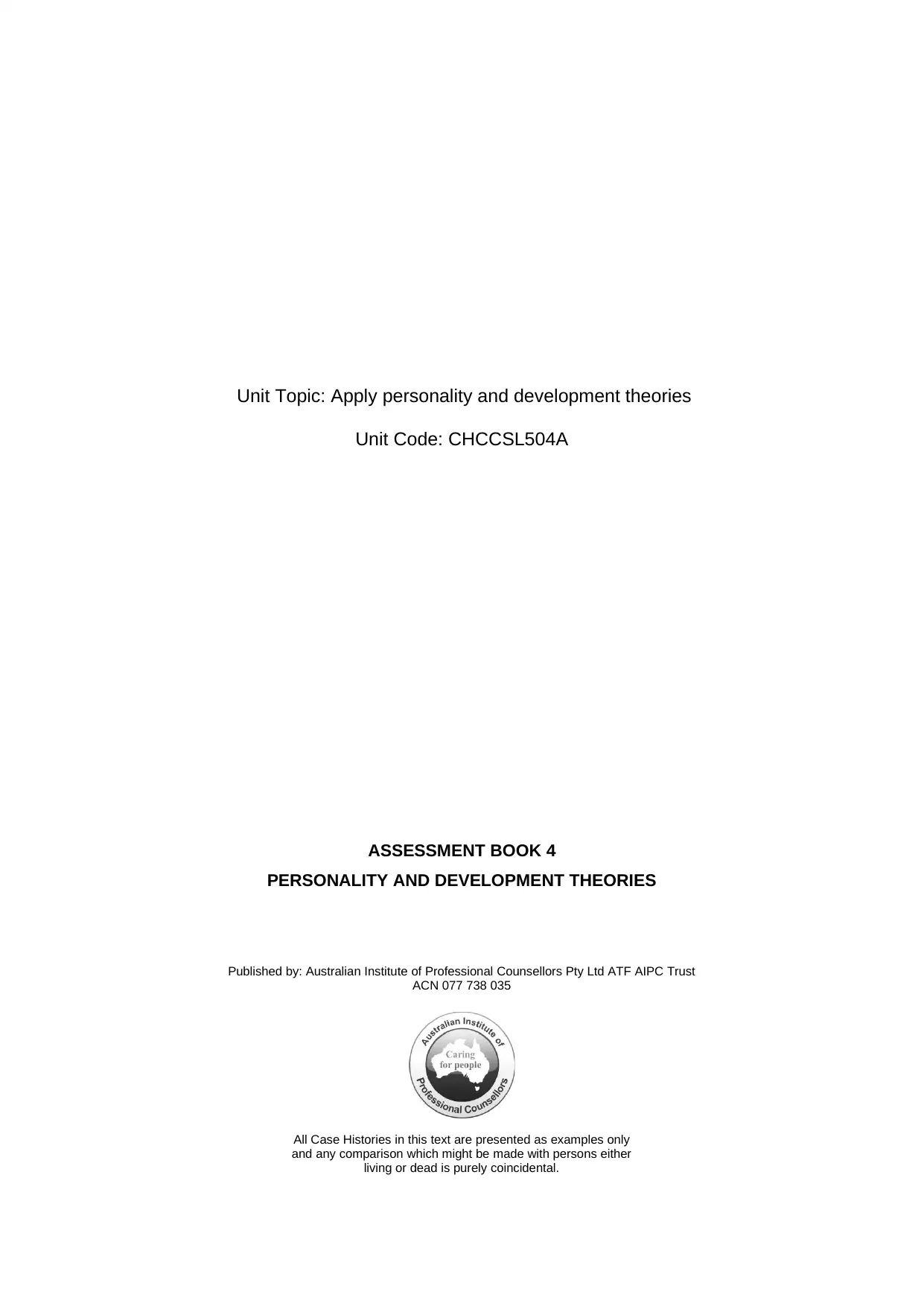
Unit Topic: Apply personality and development theories
Unit Code: CHCCSL504A
ASSESSMENT BOOK 4
PERSONALITY AND DEVELOPMENT THEORIES
Published by: Australian Institute of Professional Counsellors Pty Ltd ATF AIPC Trust
ACN 077 738 035
All Case Histories in this text are presented as examples only
and any comparison which might be made with persons either
living or dead is purely coincidental.
Unit Code: CHCCSL504A
ASSESSMENT BOOK 4
PERSONALITY AND DEVELOPMENT THEORIES
Published by: Australian Institute of Professional Counsellors Pty Ltd ATF AIPC Trust
ACN 077 738 035
All Case Histories in this text are presented as examples only
and any comparison which might be made with persons either
living or dead is purely coincidental.
Paraphrase This Document
Need a fresh take? Get an instant paraphrase of this document with our AI Paraphraser
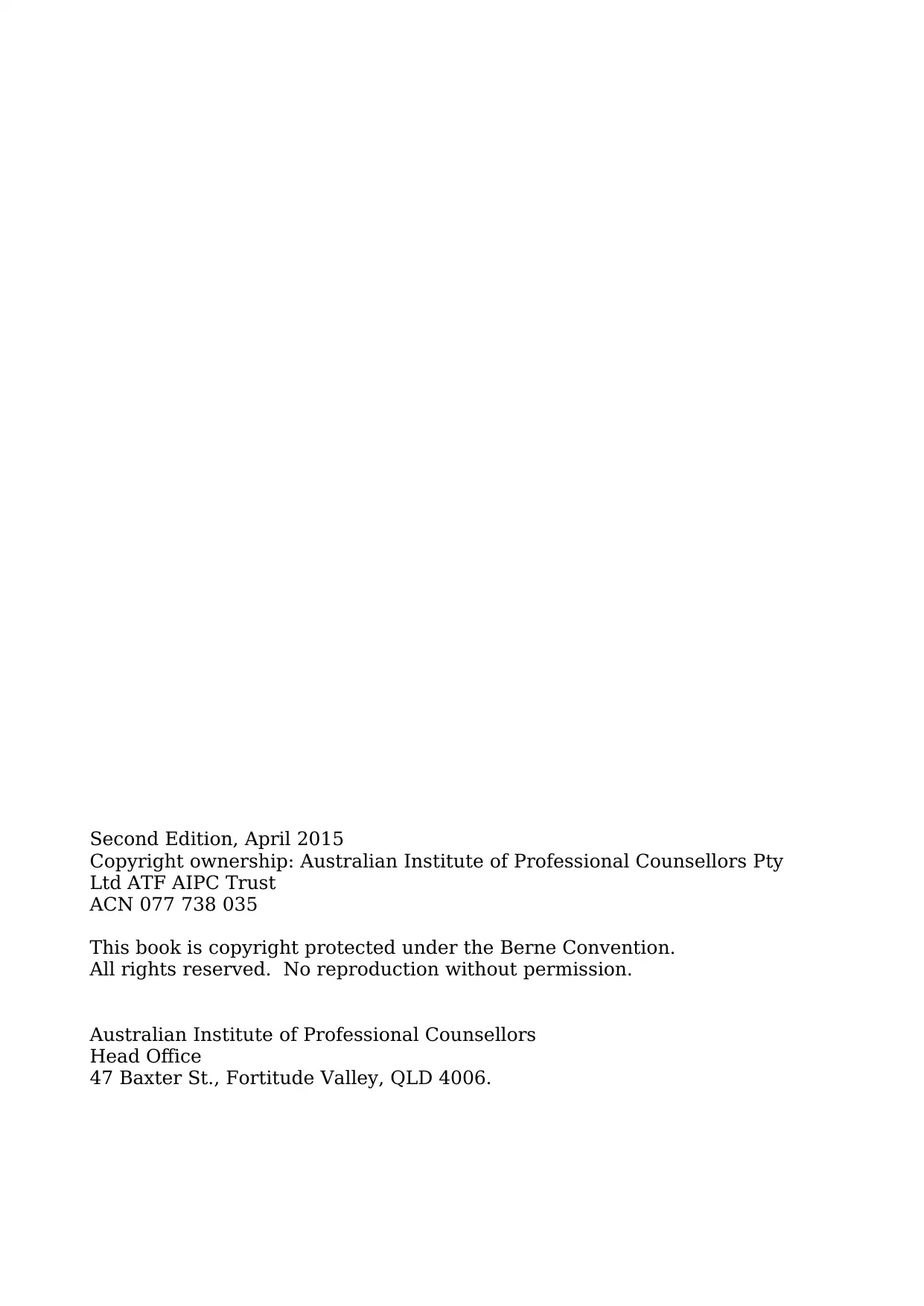
Second Edition, April 2015
Copyright ownership: Australian Institute of Professional Counsellors Pty
Ltd ATF AIPC Trust
ACN 077 738 035
This book is copyright protected under the Berne Convention.
All rights reserved. No reproduction without permission.
Australian Institute of Professional Counsellors
Head Office
47 Baxter St., Fortitude Valley, QLD 4006.
Copyright ownership: Australian Institute of Professional Counsellors Pty
Ltd ATF AIPC Trust
ACN 077 738 035
This book is copyright protected under the Berne Convention.
All rights reserved. No reproduction without permission.
Australian Institute of Professional Counsellors
Head Office
47 Baxter St., Fortitude Valley, QLD 4006.

This book is protected by copyright and may not be reproduced or copied
either in part or in whole nor used for financial gain without the express
approval in writing of the owner (Australian Institute of Professional
Counsellors Pty Ltd ATF AIPC Trust ACN 077 738 035) of the copyright.
either in part or in whole nor used for financial gain without the express
approval in writing of the owner (Australian Institute of Professional
Counsellors Pty Ltd ATF AIPC Trust ACN 077 738 035) of the copyright.
⊘ This is a preview!⊘
Do you want full access?
Subscribe today to unlock all pages.

Trusted by 1+ million students worldwide
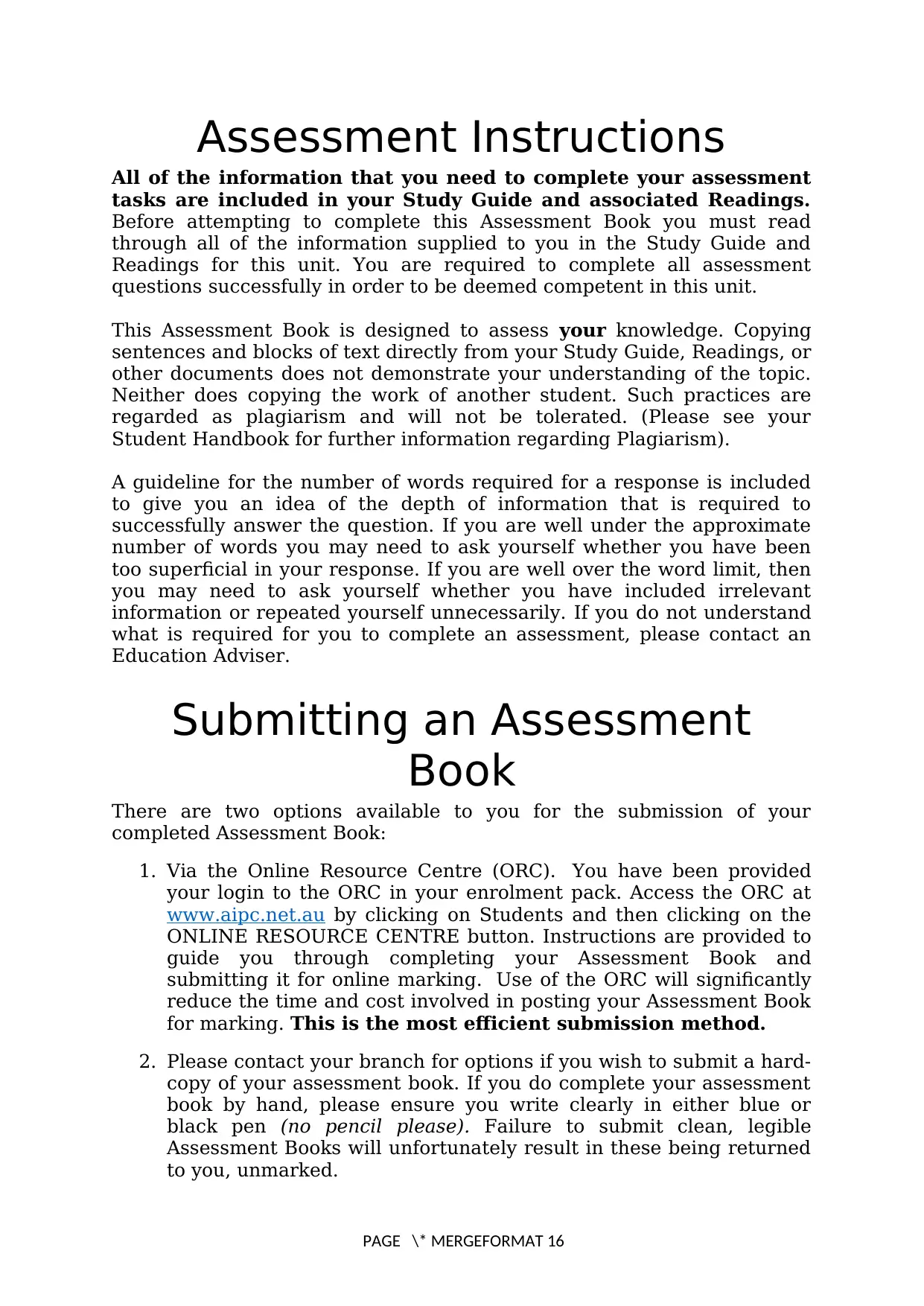
Assessment Instructions
All of the information that you need to complete your assessment
tasks are included in your Study Guide and associated Readings.
Before attempting to complete this Assessment Book you must read
through all of the information supplied to you in the Study Guide and
Readings for this unit. You are required to complete all assessment
questions successfully in order to be deemed competent in this unit.
This Assessment Book is designed to assess your knowledge. Copying
sentences and blocks of text directly from your Study Guide, Readings, or
other documents does not demonstrate your understanding of the topic.
Neither does copying the work of another student. Such practices are
regarded as plagiarism and will not be tolerated. (Please see your
Student Handbook for further information regarding Plagiarism).
A guideline for the number of words required for a response is included
to give you an idea of the depth of information that is required to
successfully answer the question. If you are well under the approximate
number of words you may need to ask yourself whether you have been
too superficial in your response. If you are well over the word limit, then
you may need to ask yourself whether you have included irrelevant
information or repeated yourself unnecessarily. If you do not understand
what is required for you to complete an assessment, please contact an
Education Adviser.
Submitting an Assessment
Book
There are two options available to you for the submission of your
completed Assessment Book:
1. Via the Online Resource Centre (ORC). You have been provided
your login to the ORC in your enrolment pack. Access the ORC at
www.aipc.net.au by clicking on Students and then clicking on the
ONLINE RESOURCE CENTRE button. Instructions are provided to
guide you through completing your Assessment Book and
submitting it for online marking. Use of the ORC will significantly
reduce the time and cost involved in posting your Assessment Book
for marking. This is the most efficient submission method.
2. Please contact your branch for options if you wish to submit a hard-
copy of your assessment book. If you do complete your assessment
book by hand, please ensure you write clearly in either blue or
black pen (no pencil please). Failure to submit clean, legible
Assessment Books will unfortunately result in these being returned
to you, unmarked.
PAGE \* MERGEFORMAT 16
All of the information that you need to complete your assessment
tasks are included in your Study Guide and associated Readings.
Before attempting to complete this Assessment Book you must read
through all of the information supplied to you in the Study Guide and
Readings for this unit. You are required to complete all assessment
questions successfully in order to be deemed competent in this unit.
This Assessment Book is designed to assess your knowledge. Copying
sentences and blocks of text directly from your Study Guide, Readings, or
other documents does not demonstrate your understanding of the topic.
Neither does copying the work of another student. Such practices are
regarded as plagiarism and will not be tolerated. (Please see your
Student Handbook for further information regarding Plagiarism).
A guideline for the number of words required for a response is included
to give you an idea of the depth of information that is required to
successfully answer the question. If you are well under the approximate
number of words you may need to ask yourself whether you have been
too superficial in your response. If you are well over the word limit, then
you may need to ask yourself whether you have included irrelevant
information or repeated yourself unnecessarily. If you do not understand
what is required for you to complete an assessment, please contact an
Education Adviser.
Submitting an Assessment
Book
There are two options available to you for the submission of your
completed Assessment Book:
1. Via the Online Resource Centre (ORC). You have been provided
your login to the ORC in your enrolment pack. Access the ORC at
www.aipc.net.au by clicking on Students and then clicking on the
ONLINE RESOURCE CENTRE button. Instructions are provided to
guide you through completing your Assessment Book and
submitting it for online marking. Use of the ORC will significantly
reduce the time and cost involved in posting your Assessment Book
for marking. This is the most efficient submission method.
2. Please contact your branch for options if you wish to submit a hard-
copy of your assessment book. If you do complete your assessment
book by hand, please ensure you write clearly in either blue or
black pen (no pencil please). Failure to submit clean, legible
Assessment Books will unfortunately result in these being returned
to you, unmarked.
PAGE \* MERGEFORMAT 16
Paraphrase This Document
Need a fresh take? Get an instant paraphrase of this document with our AI Paraphraser
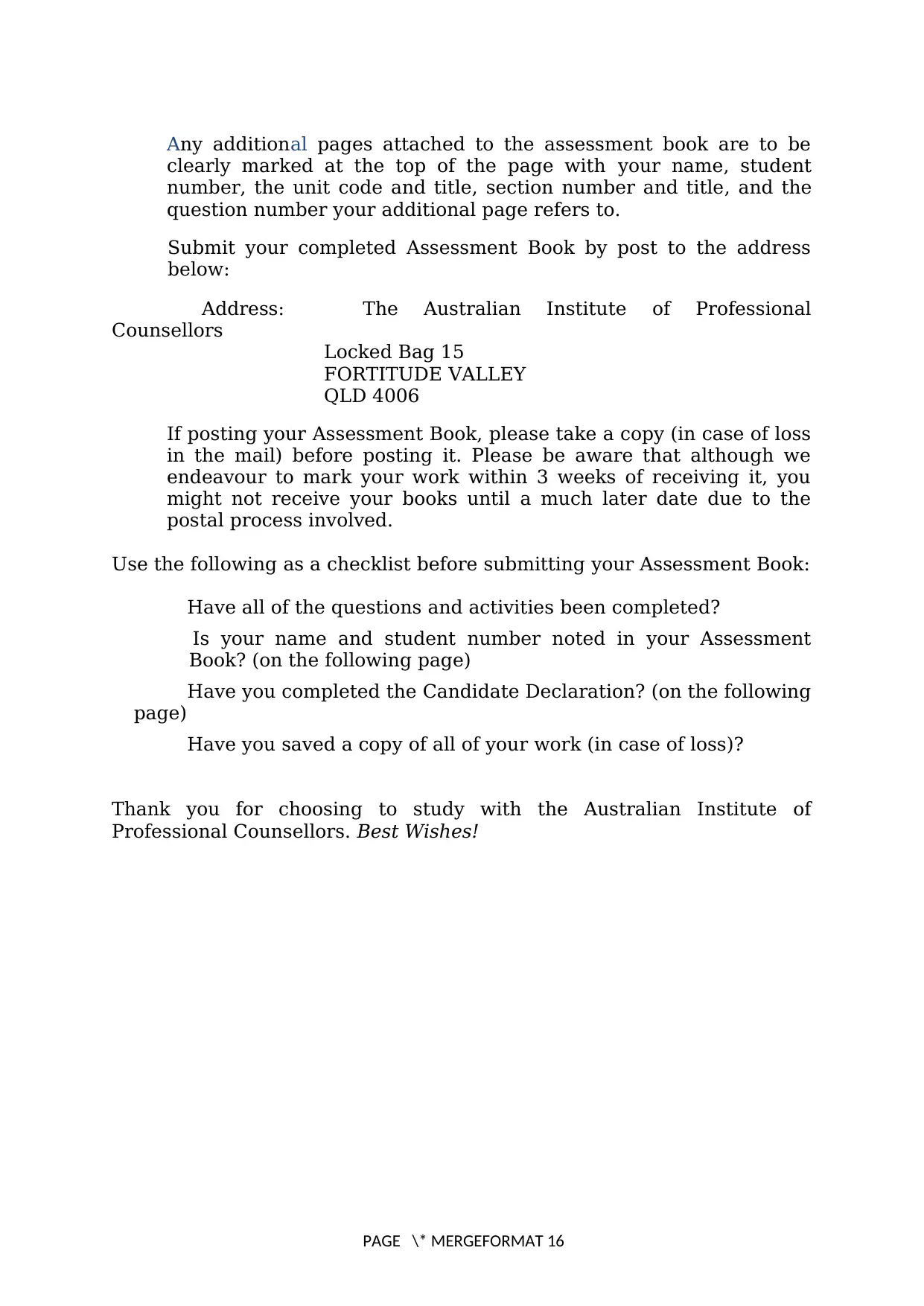
Any additional pages attached to the assessment book are to be
clearly marked at the top of the page with your name, student
number, the unit code and title, section number and title, and the
question number your additional page refers to.
Submit your completed Assessment Book by post to the address
below:
Address: The Australian Institute of Professional
Counsellors
Locked Bag 15
FORTITUDE VALLEY
QLD 4006
If posting your Assessment Book, please take a copy (in case of loss
in the mail) before posting it. Please be aware that although we
endeavour to mark your work within 3 weeks of receiving it, you
might not receive your books until a much later date due to the
postal process involved.
Use the following as a checklist before submitting your Assessment Book:
Have all of the questions and activities been completed?
Is your name and student number noted in your Assessment
Book? (on the following page)
Have you completed the Candidate Declaration? (on the following
page)
Have you saved a copy of all of your work (in case of loss)?
Thank you for choosing to study with the Australian Institute of
Professional Counsellors. Best Wishes!
PAGE \* MERGEFORMAT 16
clearly marked at the top of the page with your name, student
number, the unit code and title, section number and title, and the
question number your additional page refers to.
Submit your completed Assessment Book by post to the address
below:
Address: The Australian Institute of Professional
Counsellors
Locked Bag 15
FORTITUDE VALLEY
QLD 4006
If posting your Assessment Book, please take a copy (in case of loss
in the mail) before posting it. Please be aware that although we
endeavour to mark your work within 3 weeks of receiving it, you
might not receive your books until a much later date due to the
postal process involved.
Use the following as a checklist before submitting your Assessment Book:
Have all of the questions and activities been completed?
Is your name and student number noted in your Assessment
Book? (on the following page)
Have you completed the Candidate Declaration? (on the following
page)
Have you saved a copy of all of your work (in case of loss)?
Thank you for choosing to study with the Australian Institute of
Professional Counsellors. Best Wishes!
PAGE \* MERGEFORMAT 16
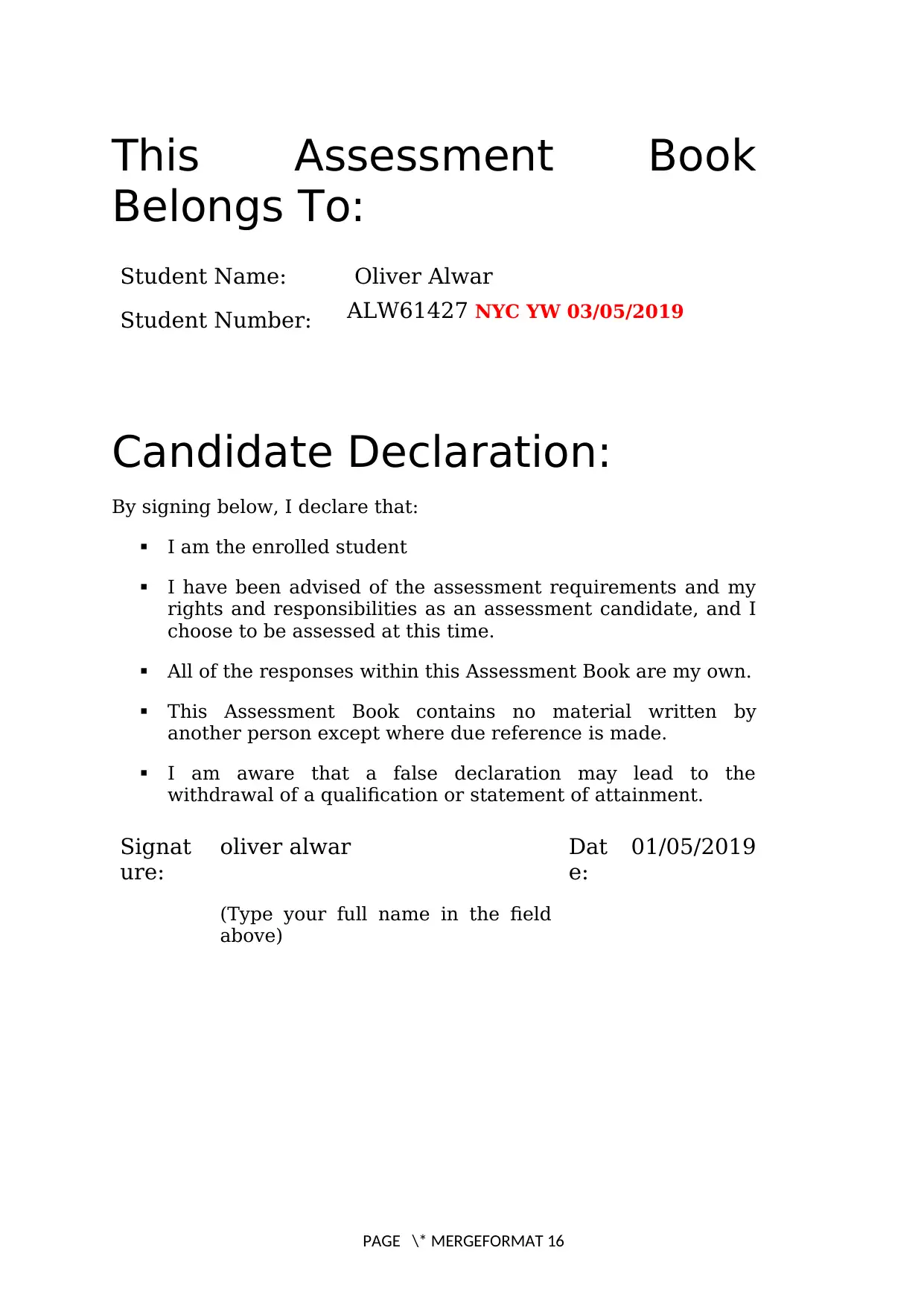
This Assessment Book
Belongs To:
Student Name: Oliver Alwar
Student Number: ALW61427 NYC YW 03/05/2019
Candidate Declaration:
By signing below, I declare that:
I am the enrolled student
I have been advised of the assessment requirements and my
rights and responsibilities as an assessment candidate, and I
choose to be assessed at this time.
All of the responses within this Assessment Book are my own.
This Assessment Book contains no material written by
another person except where due reference is made.
I am aware that a false declaration may lead to the
withdrawal of a qualification or statement of attainment.
Signat
ure:
oliver alwar Dat
e:
01/05/2019
(Type your full name in the field
above)
PAGE \* MERGEFORMAT 16
Belongs To:
Student Name: Oliver Alwar
Student Number: ALW61427 NYC YW 03/05/2019
Candidate Declaration:
By signing below, I declare that:
I am the enrolled student
I have been advised of the assessment requirements and my
rights and responsibilities as an assessment candidate, and I
choose to be assessed at this time.
All of the responses within this Assessment Book are my own.
This Assessment Book contains no material written by
another person except where due reference is made.
I am aware that a false declaration may lead to the
withdrawal of a qualification or statement of attainment.
Signat
ure:
oliver alwar Dat
e:
01/05/2019
(Type your full name in the field
above)
PAGE \* MERGEFORMAT 16
⊘ This is a preview!⊘
Do you want full access?
Subscribe today to unlock all pages.

Trusted by 1+ million students worldwide
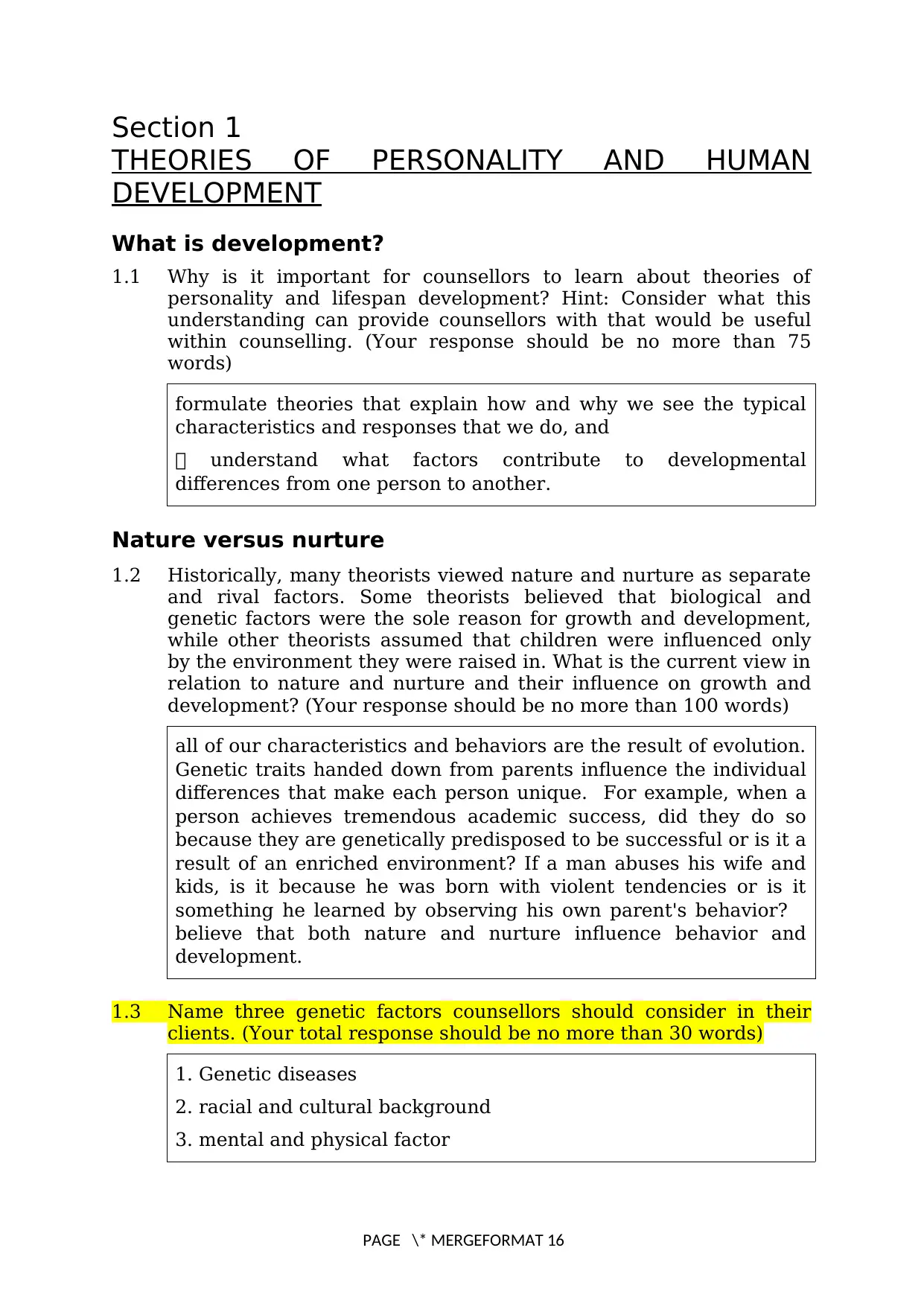
Section 1
THEORIES OF PERSONALITY AND HUMAN
DEVELOPMENT
What is development?
1.1 Why is it important for counsellors to learn about theories of
personality and lifespan development? Hint: Consider what this
understanding can provide counsellors with that would be useful
within counselling. (Your response should be no more than 75
words)
formulate theories that explain how and why we see the typical
characteristics and responses that we do, and
understand what factors contribute to developmental
differences from one person to another.
Nature versus nurture
1.2 Historically, many theorists viewed nature and nurture as separate
and rival factors. Some theorists believed that biological and
genetic factors were the sole reason for growth and development,
while other theorists assumed that children were influenced only
by the environment they were raised in. What is the current view in
relation to nature and nurture and their influence on growth and
development? (Your response should be no more than 100 words)
all of our characteristics and behaviors are the result of evolution.
Genetic traits handed down from parents influence the individual
differences that make each person unique. For example, when a
person achieves tremendous academic success, did they do so
because they are genetically predisposed to be successful or is it a
result of an enriched environment? If a man abuses his wife and
kids, is it because he was born with violent tendencies or is it
something he learned by observing his own parent's behavior?
believe that both nature and nurture influence behavior and
development.
1.3 Name three genetic factors counsellors should consider in their
clients. (Your total response should be no more than 30 words)
1. Genetic diseases
2. racial and cultural background
3. mental and physical factor
PAGE \* MERGEFORMAT 16
THEORIES OF PERSONALITY AND HUMAN
DEVELOPMENT
What is development?
1.1 Why is it important for counsellors to learn about theories of
personality and lifespan development? Hint: Consider what this
understanding can provide counsellors with that would be useful
within counselling. (Your response should be no more than 75
words)
formulate theories that explain how and why we see the typical
characteristics and responses that we do, and
understand what factors contribute to developmental
differences from one person to another.
Nature versus nurture
1.2 Historically, many theorists viewed nature and nurture as separate
and rival factors. Some theorists believed that biological and
genetic factors were the sole reason for growth and development,
while other theorists assumed that children were influenced only
by the environment they were raised in. What is the current view in
relation to nature and nurture and their influence on growth and
development? (Your response should be no more than 100 words)
all of our characteristics and behaviors are the result of evolution.
Genetic traits handed down from parents influence the individual
differences that make each person unique. For example, when a
person achieves tremendous academic success, did they do so
because they are genetically predisposed to be successful or is it a
result of an enriched environment? If a man abuses his wife and
kids, is it because he was born with violent tendencies or is it
something he learned by observing his own parent's behavior?
believe that both nature and nurture influence behavior and
development.
1.3 Name three genetic factors counsellors should consider in their
clients. (Your total response should be no more than 30 words)
1. Genetic diseases
2. racial and cultural background
3. mental and physical factor
PAGE \* MERGEFORMAT 16
Paraphrase This Document
Need a fresh take? Get an instant paraphrase of this document with our AI Paraphraser
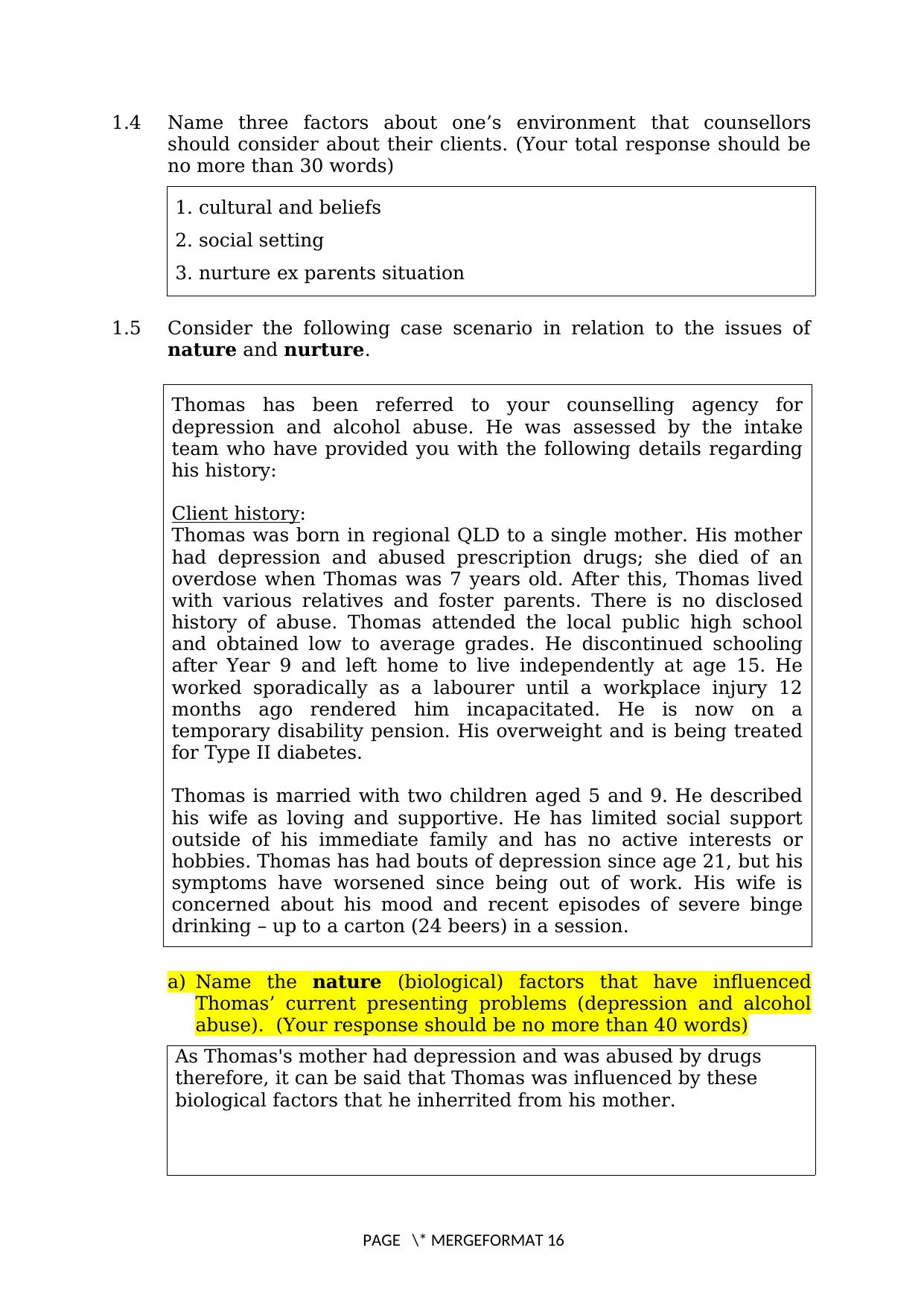
1.4 Name three factors about one’s environment that counsellors
should consider about their clients. (Your total response should be
no more than 30 words)
1. cultural and beliefs
2. social setting
3. nurture ex parents situation
1.5 Consider the following case scenario in relation to the issues of
nature and nurture.
Thomas has been referred to your counselling agency for
depression and alcohol abuse. He was assessed by the intake
team who have provided you with the following details regarding
his history:
Client history:
Thomas was born in regional QLD to a single mother. His mother
had depression and abused prescription drugs; she died of an
overdose when Thomas was 7 years old. After this, Thomas lived
with various relatives and foster parents. There is no disclosed
history of abuse. Thomas attended the local public high school
and obtained low to average grades. He discontinued schooling
after Year 9 and left home to live independently at age 15. He
worked sporadically as a labourer until a workplace injury 12
months ago rendered him incapacitated. He is now on a
temporary disability pension. His overweight and is being treated
for Type II diabetes.
Thomas is married with two children aged 5 and 9. He described
his wife as loving and supportive. He has limited social support
outside of his immediate family and has no active interests or
hobbies. Thomas has had bouts of depression since age 21, but his
symptoms have worsened since being out of work. His wife is
concerned about his mood and recent episodes of severe binge
drinking – up to a carton (24 beers) in a session.
a) Name the nature (biological) factors that have influenced
Thomas’ current presenting problems (depression and alcohol
abuse). (Your response should be no more than 40 words)
As Thomas's mother had depression and was abused by drugs
therefore, it can be said that Thomas was influenced by these
biological factors that he inherrited from his mother.
PAGE \* MERGEFORMAT 16
should consider about their clients. (Your total response should be
no more than 30 words)
1. cultural and beliefs
2. social setting
3. nurture ex parents situation
1.5 Consider the following case scenario in relation to the issues of
nature and nurture.
Thomas has been referred to your counselling agency for
depression and alcohol abuse. He was assessed by the intake
team who have provided you with the following details regarding
his history:
Client history:
Thomas was born in regional QLD to a single mother. His mother
had depression and abused prescription drugs; she died of an
overdose when Thomas was 7 years old. After this, Thomas lived
with various relatives and foster parents. There is no disclosed
history of abuse. Thomas attended the local public high school
and obtained low to average grades. He discontinued schooling
after Year 9 and left home to live independently at age 15. He
worked sporadically as a labourer until a workplace injury 12
months ago rendered him incapacitated. He is now on a
temporary disability pension. His overweight and is being treated
for Type II diabetes.
Thomas is married with two children aged 5 and 9. He described
his wife as loving and supportive. He has limited social support
outside of his immediate family and has no active interests or
hobbies. Thomas has had bouts of depression since age 21, but his
symptoms have worsened since being out of work. His wife is
concerned about his mood and recent episodes of severe binge
drinking – up to a carton (24 beers) in a session.
a) Name the nature (biological) factors that have influenced
Thomas’ current presenting problems (depression and alcohol
abuse). (Your response should be no more than 40 words)
As Thomas's mother had depression and was abused by drugs
therefore, it can be said that Thomas was influenced by these
biological factors that he inherrited from his mother.
PAGE \* MERGEFORMAT 16
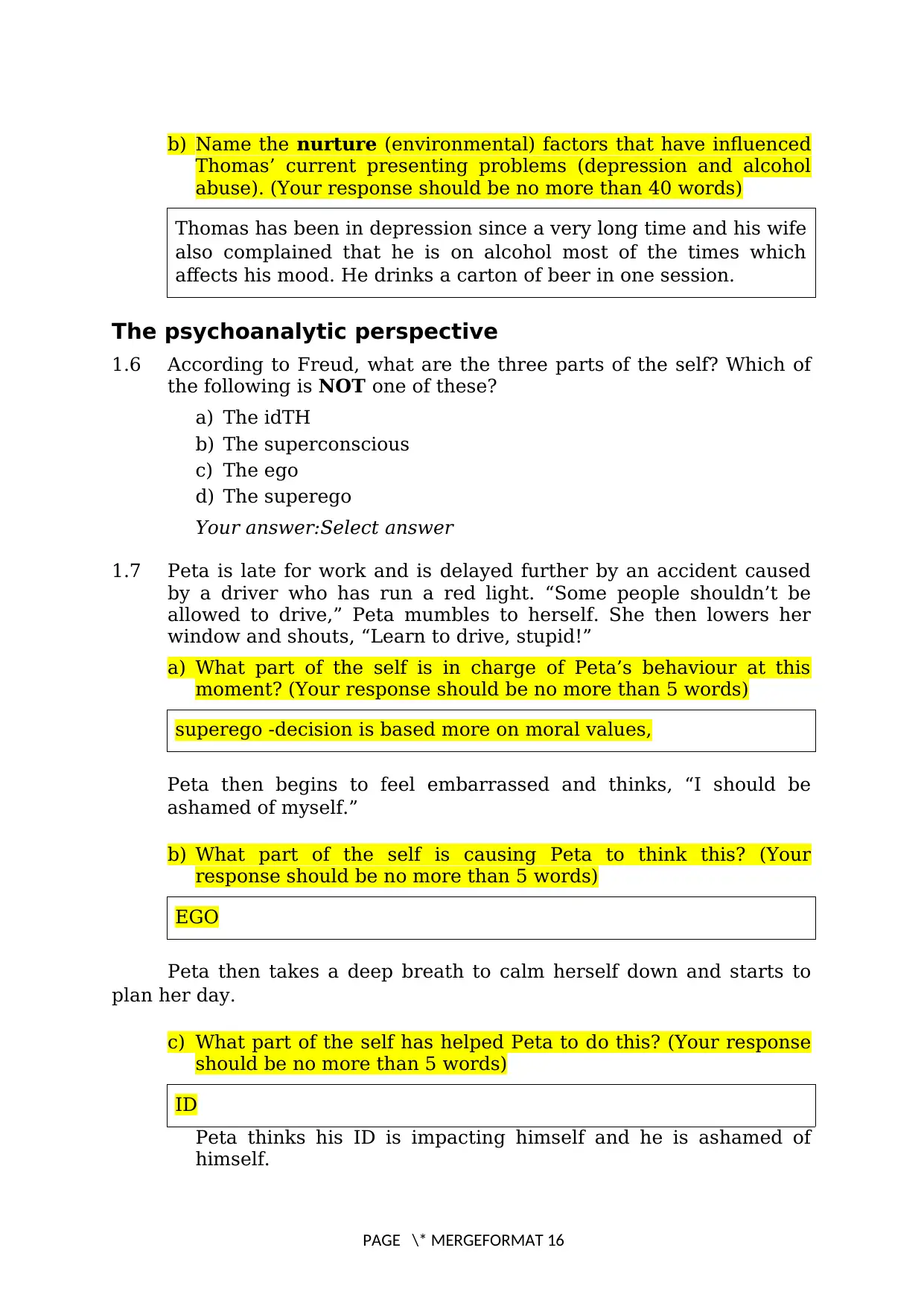
b) Name the nurture (environmental) factors that have influenced
Thomas’ current presenting problems (depression and alcohol
abuse). (Your response should be no more than 40 words)
Thomas has been in depression since a very long time and his wife
also complained that he is on alcohol most of the times which
affects his mood. He drinks a carton of beer in one session.
The psychoanalytic perspective
1.6 According to Freud, what are the three parts of the self? Which of
the following is NOT one of these?
a) The idTH
b) The superconscious
c) The ego
d) The superego
Your answer:Select answer
1.7 Peta is late for work and is delayed further by an accident caused
by a driver who has run a red light. “Some people shouldn’t be
allowed to drive,” Peta mumbles to herself. She then lowers her
window and shouts, “Learn to drive, stupid!”
a) What part of the self is in charge of Peta’s behaviour at this
moment? (Your response should be no more than 5 words)
superego -decision is based more on moral values,
Peta then begins to feel embarrassed and thinks, “I should be
ashamed of myself.”
b) What part of the self is causing Peta to think this? (Your
response should be no more than 5 words)
EGO
Peta then takes a deep breath to calm herself down and starts to
plan her day.
c) What part of the self has helped Peta to do this? (Your response
should be no more than 5 words)
ID
Peta thinks his ID is impacting himself and he is ashamed of
himself.
PAGE \* MERGEFORMAT 16
Thomas’ current presenting problems (depression and alcohol
abuse). (Your response should be no more than 40 words)
Thomas has been in depression since a very long time and his wife
also complained that he is on alcohol most of the times which
affects his mood. He drinks a carton of beer in one session.
The psychoanalytic perspective
1.6 According to Freud, what are the three parts of the self? Which of
the following is NOT one of these?
a) The idTH
b) The superconscious
c) The ego
d) The superego
Your answer:Select answer
1.7 Peta is late for work and is delayed further by an accident caused
by a driver who has run a red light. “Some people shouldn’t be
allowed to drive,” Peta mumbles to herself. She then lowers her
window and shouts, “Learn to drive, stupid!”
a) What part of the self is in charge of Peta’s behaviour at this
moment? (Your response should be no more than 5 words)
superego -decision is based more on moral values,
Peta then begins to feel embarrassed and thinks, “I should be
ashamed of myself.”
b) What part of the self is causing Peta to think this? (Your
response should be no more than 5 words)
EGO
Peta then takes a deep breath to calm herself down and starts to
plan her day.
c) What part of the self has helped Peta to do this? (Your response
should be no more than 5 words)
ID
Peta thinks his ID is impacting himself and he is ashamed of
himself.
PAGE \* MERGEFORMAT 16
⊘ This is a preview!⊘
Do you want full access?
Subscribe today to unlock all pages.

Trusted by 1+ million students worldwide
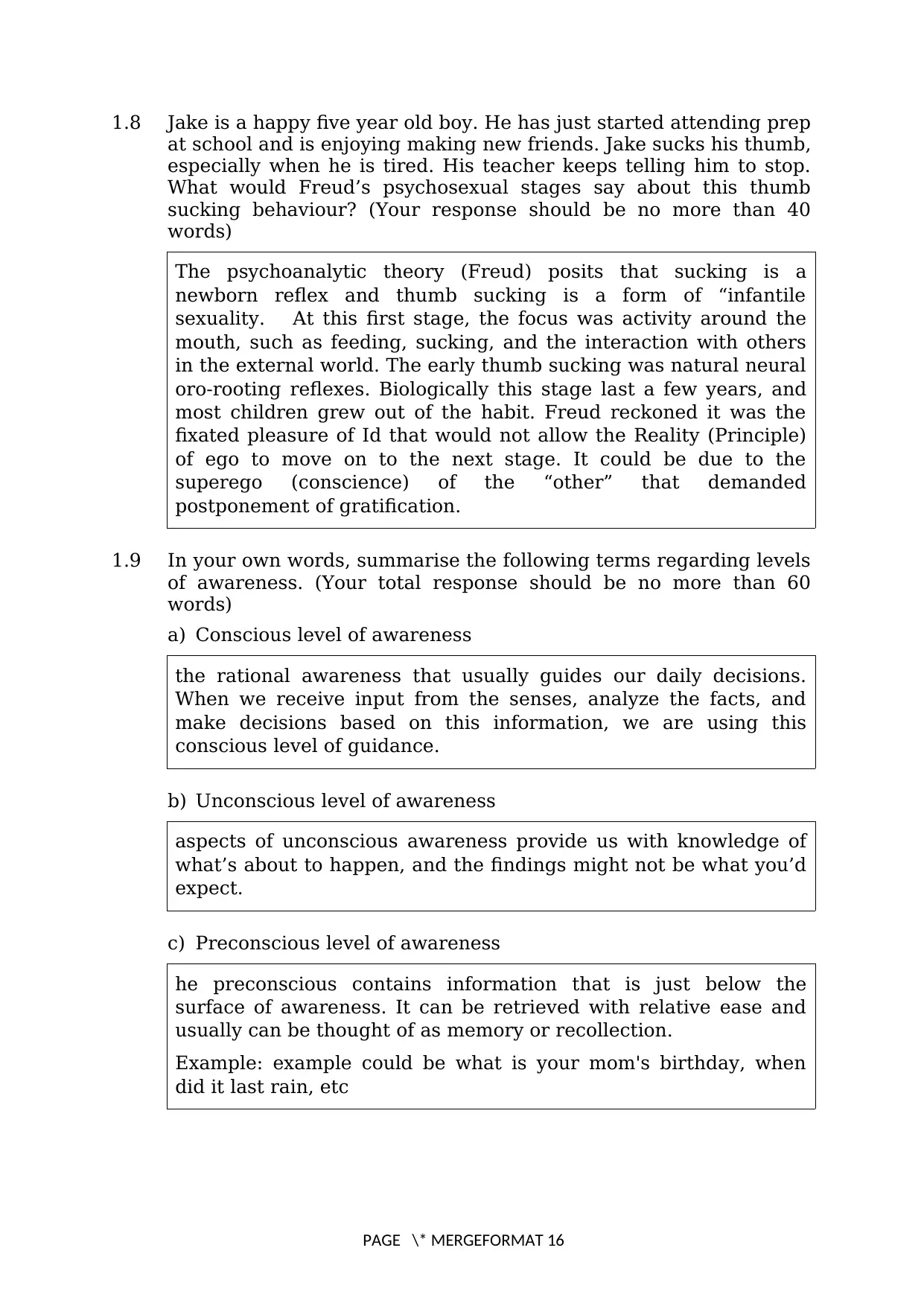
1.8 Jake is a happy five year old boy. He has just started attending prep
at school and is enjoying making new friends. Jake sucks his thumb,
especially when he is tired. His teacher keeps telling him to stop.
What would Freud’s psychosexual stages say about this thumb
sucking behaviour? (Your response should be no more than 40
words)
The psychoanalytic theory (Freud) posits that sucking is a
newborn reflex and thumb sucking is a form of “infantile
sexuality. At this first stage, the focus was activity around the
mouth, such as feeding, sucking, and the interaction with others
in the external world. The early thumb sucking was natural neural
oro-rooting reflexes. Biologically this stage last a few years, and
most children grew out of the habit. Freud reckoned it was the
fixated pleasure of Id that would not allow the Reality (Principle)
of ego to move on to the next stage. It could be due to the
superego (conscience) of the “other” that demanded
postponement of gratification.
1.9 In your own words, summarise the following terms regarding levels
of awareness. (Your total response should be no more than 60
words)
a) Conscious level of awareness
the rational awareness that usually guides our daily decisions.
When we receive input from the senses, analyze the facts, and
make decisions based on this information, we are using this
conscious level of guidance.
b) Unconscious level of awareness
aspects of unconscious awareness provide us with knowledge of
what’s about to happen, and the findings might not be what you’d
expect.
c) Preconscious level of awareness
he preconscious contains information that is just below the
surface of awareness. It can be retrieved with relative ease and
usually can be thought of as memory or recollection.
Example: example could be what is your mom's birthday, when
did it last rain, etc
PAGE \* MERGEFORMAT 16
at school and is enjoying making new friends. Jake sucks his thumb,
especially when he is tired. His teacher keeps telling him to stop.
What would Freud’s psychosexual stages say about this thumb
sucking behaviour? (Your response should be no more than 40
words)
The psychoanalytic theory (Freud) posits that sucking is a
newborn reflex and thumb sucking is a form of “infantile
sexuality. At this first stage, the focus was activity around the
mouth, such as feeding, sucking, and the interaction with others
in the external world. The early thumb sucking was natural neural
oro-rooting reflexes. Biologically this stage last a few years, and
most children grew out of the habit. Freud reckoned it was the
fixated pleasure of Id that would not allow the Reality (Principle)
of ego to move on to the next stage. It could be due to the
superego (conscience) of the “other” that demanded
postponement of gratification.
1.9 In your own words, summarise the following terms regarding levels
of awareness. (Your total response should be no more than 60
words)
a) Conscious level of awareness
the rational awareness that usually guides our daily decisions.
When we receive input from the senses, analyze the facts, and
make decisions based on this information, we are using this
conscious level of guidance.
b) Unconscious level of awareness
aspects of unconscious awareness provide us with knowledge of
what’s about to happen, and the findings might not be what you’d
expect.
c) Preconscious level of awareness
he preconscious contains information that is just below the
surface of awareness. It can be retrieved with relative ease and
usually can be thought of as memory or recollection.
Example: example could be what is your mom's birthday, when
did it last rain, etc
PAGE \* MERGEFORMAT 16
Paraphrase This Document
Need a fresh take? Get an instant paraphrase of this document with our AI Paraphraser
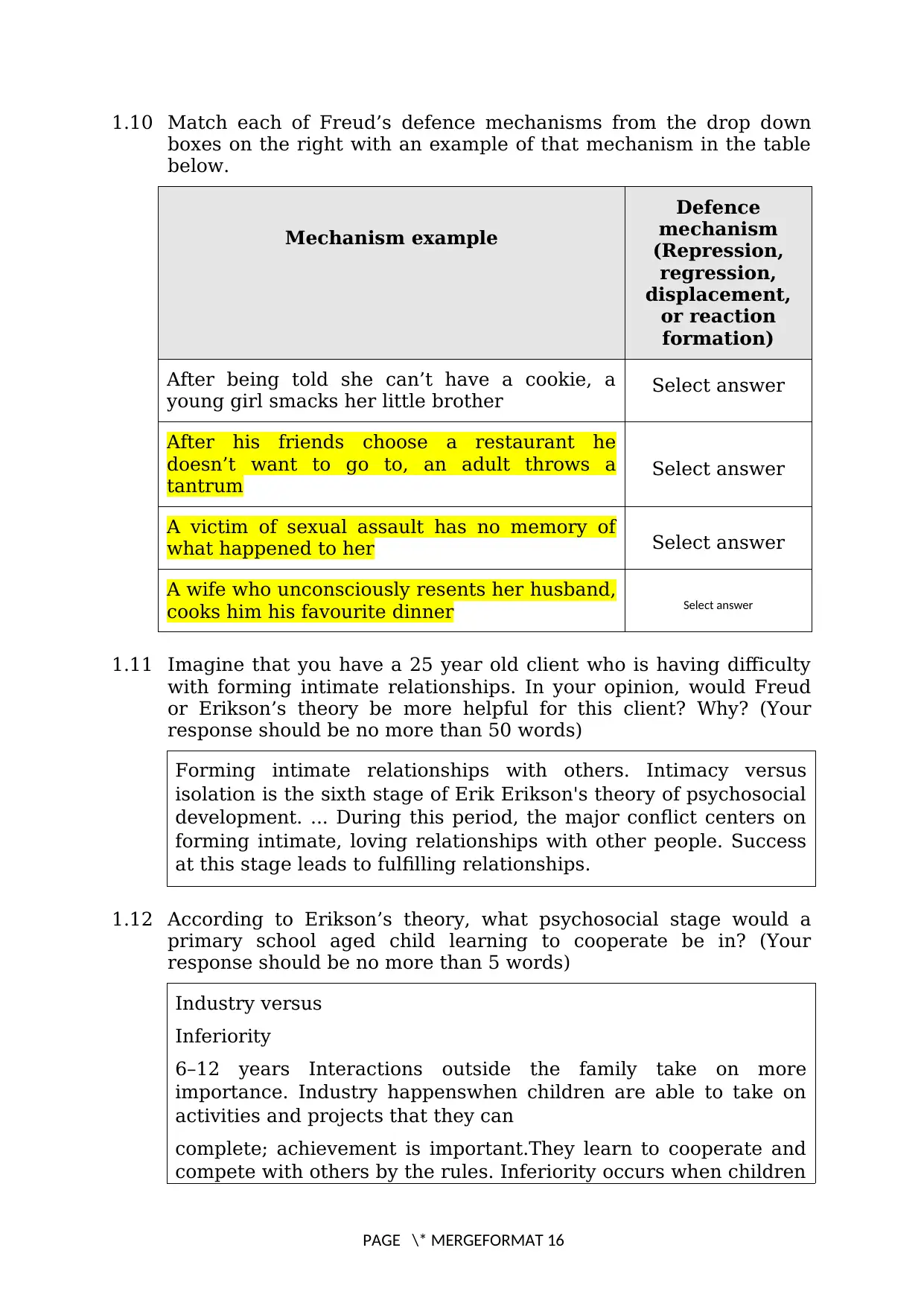
1.10 Match each of Freud’s defence mechanisms from the drop down
boxes on the right with an example of that mechanism in the table
below.
Mechanism example
Defence
mechanism
(Repression,
regression,
displacement,
or reaction
formation)
After being told she can’t have a cookie, a
young girl smacks her little brother Select answer
After his friends choose a restaurant he
doesn’t want to go to, an adult throws a
tantrum Select answer
A victim of sexual assault has no memory of
what happened to her Select answer
A wife who unconsciously resents her husband,
cooks him his favourite dinner Select answer
1.11 Imagine that you have a 25 year old client who is having difficulty
with forming intimate relationships. In your opinion, would Freud
or Erikson’s theory be more helpful for this client? Why? (Your
response should be no more than 50 words)
Forming intimate relationships with others. Intimacy versus
isolation is the sixth stage of Erik Erikson's theory of psychosocial
development. ... During this period, the major conflict centers on
forming intimate, loving relationships with other people. Success
at this stage leads to fulfilling relationships.
1.12 According to Erikson’s theory, what psychosocial stage would a
primary school aged child learning to cooperate be in? (Your
response should be no more than 5 words)
Industry versus
Inferiority
6–12 years Interactions outside the family take on more
importance. Industry happenswhen children are able to take on
activities and projects that they can
complete; achievement is important.They learn to cooperate and
compete with others by the rules. Inferiority occurs when children
PAGE \* MERGEFORMAT 16
boxes on the right with an example of that mechanism in the table
below.
Mechanism example
Defence
mechanism
(Repression,
regression,
displacement,
or reaction
formation)
After being told she can’t have a cookie, a
young girl smacks her little brother Select answer
After his friends choose a restaurant he
doesn’t want to go to, an adult throws a
tantrum Select answer
A victim of sexual assault has no memory of
what happened to her Select answer
A wife who unconsciously resents her husband,
cooks him his favourite dinner Select answer
1.11 Imagine that you have a 25 year old client who is having difficulty
with forming intimate relationships. In your opinion, would Freud
or Erikson’s theory be more helpful for this client? Why? (Your
response should be no more than 50 words)
Forming intimate relationships with others. Intimacy versus
isolation is the sixth stage of Erik Erikson's theory of psychosocial
development. ... During this period, the major conflict centers on
forming intimate, loving relationships with other people. Success
at this stage leads to fulfilling relationships.
1.12 According to Erikson’s theory, what psychosocial stage would a
primary school aged child learning to cooperate be in? (Your
response should be no more than 5 words)
Industry versus
Inferiority
6–12 years Interactions outside the family take on more
importance. Industry happenswhen children are able to take on
activities and projects that they can
complete; achievement is important.They learn to cooperate and
compete with others by the rules. Inferiority occurs when children
PAGE \* MERGEFORMAT 16
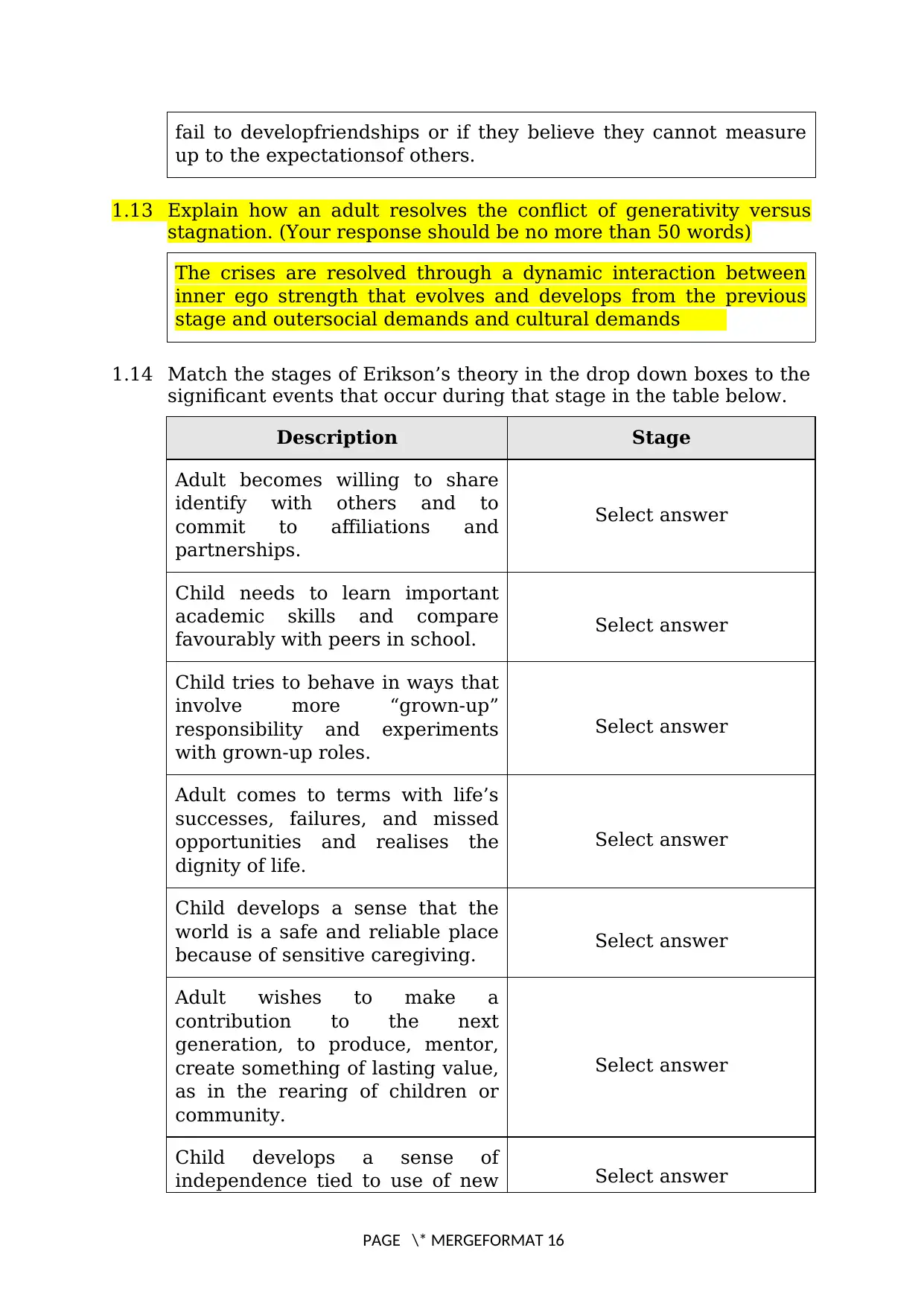
fail to developfriendships or if they believe they cannot measure
up to the expectationsof others.
1.13 Explain how an adult resolves the conflict of generativity versus
stagnation. (Your response should be no more than 50 words)
The crises are resolved through a dynamic interaction between
inner ego strength that evolves and develops from the previous
stage and outersocial demands and cultural demands
1.14 Match the stages of Erikson’s theory in the drop down boxes to the
significant events that occur during that stage in the table below.
Description Stage
Adult becomes willing to share
identify with others and to
commit to affiliations and
partnerships.
Select answer
Child needs to learn important
academic skills and compare
favourably with peers in school. Select answer
Child tries to behave in ways that
involve more “grown-up”
responsibility and experiments
with grown-up roles.
Select answer
Adult comes to terms with life’s
successes, failures, and missed
opportunities and realises the
dignity of life.
Select answer
Child develops a sense that the
world is a safe and reliable place
because of sensitive caregiving. Select answer
Adult wishes to make a
contribution to the next
generation, to produce, mentor,
create something of lasting value,
as in the rearing of children or
community.
Select answer
Child develops a sense of
independence tied to use of new Select answer
PAGE \* MERGEFORMAT 16
up to the expectationsof others.
1.13 Explain how an adult resolves the conflict of generativity versus
stagnation. (Your response should be no more than 50 words)
The crises are resolved through a dynamic interaction between
inner ego strength that evolves and develops from the previous
stage and outersocial demands and cultural demands
1.14 Match the stages of Erikson’s theory in the drop down boxes to the
significant events that occur during that stage in the table below.
Description Stage
Adult becomes willing to share
identify with others and to
commit to affiliations and
partnerships.
Select answer
Child needs to learn important
academic skills and compare
favourably with peers in school. Select answer
Child tries to behave in ways that
involve more “grown-up”
responsibility and experiments
with grown-up roles.
Select answer
Adult comes to terms with life’s
successes, failures, and missed
opportunities and realises the
dignity of life.
Select answer
Child develops a sense that the
world is a safe and reliable place
because of sensitive caregiving. Select answer
Adult wishes to make a
contribution to the next
generation, to produce, mentor,
create something of lasting value,
as in the rearing of children or
community.
Select answer
Child develops a sense of
independence tied to use of new Select answer
PAGE \* MERGEFORMAT 16
⊘ This is a preview!⊘
Do you want full access?
Subscribe today to unlock all pages.

Trusted by 1+ million students worldwide
1 out of 35
Related Documents
Your All-in-One AI-Powered Toolkit for Academic Success.
+13062052269
info@desklib.com
Available 24*7 on WhatsApp / Email
![[object Object]](/_next/static/media/star-bottom.7253800d.svg)
Unlock your academic potential
Copyright © 2020–2026 A2Z Services. All Rights Reserved. Developed and managed by ZUCOL.
